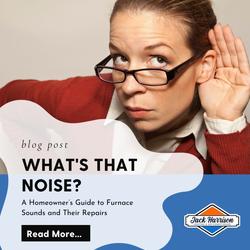Decoding Furnace Noises: Homeowner Guide to Repairs
Every homeowner has experienced it—the unsettling noise coming from your furnace or heating system. Whether it's a loud bang, a persistent whistling, or an eerie rattling, these sounds can leave you worried about potential issues and repair costs. Understanding these noises and their meanings can save you time, money, and stress. In this guide, we'll break down common furnace sounds, what they typically signify, and the associated repair costs.
Banging Noises When the Furnace Turns On
Common Causes of Banging Noises
A loud bang when your furnace turns on can often be traced back to an air filter issue. This is one of the most common and fortunately, least expensive problems you can encounter. Air filters play a crucial role in your heating system, catching dust and debris to keep the air clean. When dirty or clogged, they can cause a pressure buildup that results in a banging noise.
Repair Options and Costs
Changing the air filter is a simple DIY task that homeowners can easily handle. Air filters typically cost $10-$20 at your local hardware store. However, if the noise persists, it might indicate a problem with your ductwork. Properly sized ductwork is vital for the efficient operation of your heating system. Modifications to ductwork can start at a couple of hundred dollars and go up to $1,000+ depending on the extent of the required changes.
Other Potential Causes
While air filters are often the culprit, other blockages within the system can also cause similar noises. These blockages may require professional intervention and can lead to more significant expenses. Therefore, if changing the air filter doesn't resolve the issue, it's advisable to consult a heating system professional as you may need a furnace repair.
Whistling High-Pitched Noises
Identifying the Source
A high-pitched whistling noise is often a sign of airflow restrictions within your heating system. This can be caused by a variety of issues, including a clogged filter, closed air vents, or even gaps in the ductwork.
Repair Options and Costs
The first step is to check and replace the air filter if necessary. If the filter is not the issue, inspecting and opening closed air vents around your home can help. Repairing the ductwork is key. Sealing gaps in ductwork may require a professional and can range from $100 to $500+ depending on the severity of the issue.
Preventative Measures
Regular maintenance, such as changing air filters and ensuring vents remain open and unobstructed, can prevent these whistling noises and maintain efficient airflow throughout your home.
Low-Pitched Grrrr Sound
What It Indicates
If you're hearing a loud, low-pitched "grrrr" sound, it could point to an issue with either the capacitor or the blower motor. The capacitor helps start the motor by providing a boost of energy, while the blower motor circulates air through your home's ductwork.
Repair Options and Costs
A faulty capacitor is usually less costly to fix, typically around $100-$280. However, if the problem lies with the blower motor, the costs can rise significantly. Replacing a blower motor can cost anywhere from $600 to $1,500, depending on the type and model of the motor.
Signs of Capacitor Issues
A "wom...wom...wom..." sound as the blower motor starts often indicates a bad capacitor. If left unaddressed, this issue can eventually affect the blower motor itself, leading to higher repair costs.
Rattling Noises
Identifying the Cause
Rattling noises are usually due to debris caught in the blower wheel or an issue with the blower wheel itself. This noise can range from mildly annoying to severely disruptive, depending on the extent of the debris or damage.
Repair Options and Costs
Removing debris from the blower wheel is a straightforward cleaning job that costs around $149. However, if the blower wheel is damaged and needs replacing, expect to pay between $250 and $400.
Regular Maintenance Tips
Regular annual HVAC maintenance, including cleaning and inspecting the blower wheel, can prevent these issues. Scheduling annual tune-ups with a professional can help keep your heating system in top shape.
Smoke Smell
Normal or Concerning?
A smoke smell from your furnace can be alarming. If it's the first time your furnace is starting up for the season, this is usually normal as it burns off accumulated dust. However, if you notice this smell during regular operation, it could indicate the furnace is overheating.
Immediate Actions
If you smell smoke during the heating season, turn off your furnace and contact a professional immediately. Overheating can lead to more severe issues and even pose a fire hazard.
Preventative Measures
Ensure regular furnace maintenance and cleaning before the heating season begins. A professional can inspect the system to prevent overheating issues.
Recognizing the sounds your furnace makes can help you avoid costly repairs and keep your heating system running efficiently. Regular maintenance and timely repairs are essential to ensure dependable warmth. From simple fixes like replacing air filters to more involved repairs, understanding what each noise may indicate empowers you to make informed choices.
If you’re hearing any of these sounds or noticing other furnace issues, reach out to a professional for an inspection. Routine check-ups can catch minor issues before they lead to major repairs. Contact our team today to schedule seasonal maintenance and ensure your home stays warm and comfortable all winter.

